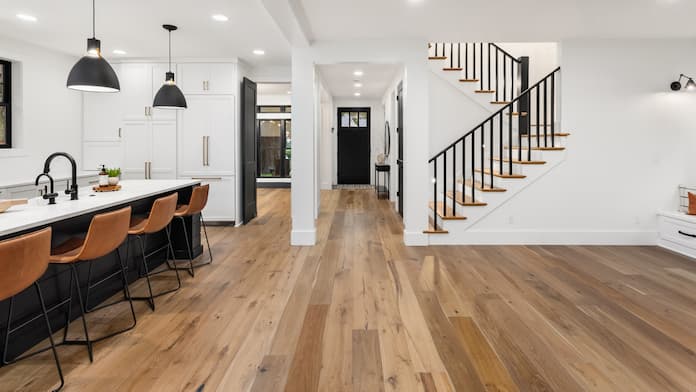How Much Do Luxury Vinyl Floors Cost?
On average, luxury vinyl floors can cost anywhere from $4 to $16 per square foot, including installation, or between $2,000 and $16,000 in total. The final price depends on factors such as the size and shape of the room, the quality of the materials, thickness, style, and labor costs.
Major Cost Factors of Vinyl Flooring Installation

In 2016, the global vinyl flooring market was estimated at $20.2 billion, and it was expected to reach $48.5 billion by 2023.
Given the rising demand, it’s crucial to budget carefully, considering all factors when estimating vinyl flooring costs.
Size and Shape of Room
Larger rooms need more materials and labor, which naturally drives up costs. Irregularly shaped rooms, like L-shaped or U-shaped spaces, add complexity with intricate cuts and precise fitting, leading to higher expenses.
Moreover, installing intricate patterns, like diagonal layouts, requires more labor and results in more material waste, pushing costs even higher. On the other hand, simpler, rectangular rooms usually cost less to install due to fewer complications.
Here’s a breakdown of luxury vinyl flooring costs based on different room sizes.
- Floor Size (Square Feet) Average Total Cost
- 100 $400 – $1,600
- 300 $1,200 – $4,800
- 500 $2,000 – $8,000
- 1,000 $4,000 – $16,000
- 1,500 $6,000 – $24,000
- 2,000 $8,000 – $32,000
Type
The type of vinyl flooring you choose significantly impacts the overall cost of installation. Here are some of the types with their costs.
- Type of Vinyl Flooring Average Total Cost Per Sq Ft
- Rigid vinyl planks $3 – $11
- Luxury vinyl planks $4 – $13
- Luxury vinyl tile $3 – $13
- Sheet vinyl $2.50 – $8.50
Rigid Vinyl Planks
Rigid core vinyl planks, including options like WPC (Wood Plastic Composite) and SPC (Stone Plastic Composite), are known for their rigidity and stability, making them well-suited for areas prone to high moisture or temperature changes.
The cost for standard rigid vinyl plank flooring ranges from $1 to $4 per square foot, with installation bringing the total to $3 to $11 per square foot.
Luxury Vinyl Planks
Luxury vinyl planks (LVP) mimic the look of hardwood flooring, come in a range of wood finishes, and are known for being both durable and water-resistant.
On average, LVP flooring costs between $2 and $5 per square foot for the materials alone, and between $4 and $13 per square foot when including labor.
Luxury vinyl plank flooring costs more than rigid vinyl planks because they are softer and thicker.
Luxury Vinyl Tile
Luxury vinyl tile (LVT) is designed to mimic the appearance of stone or ceramic tile, offering a durable alternative that delivers the same look without the high price tag.
LVT flooring typically costs between $1 and $5 per square foot for materials, with installation bringing the total to $3 to $13 per square foot.
Sheet Vinyl
Although not as popular in the luxury segment, sheet vinyl provides a seamless, highly water-resistant surface, making it a common choice for bathrooms or kitchens.
Sheet vinyl flooring typically costs between $0.50 and $1.50 per square foot for the material, or $2.50 to $8.50 per square foot with installation, making it an affordable option for budget-conscious homeowners.
Thickness
Core and Finish
Labor
The average cost of installing vinyl flooring in the luxury category usually falls between $2 and $8 per square foot, depending on factors like the layout’s complexity, installation method (glue-down or click-lock), and local labor rates.
Extra expenses may come from prepping the subfloor, removing old flooring, or working around things like stairs or detailed designs.
Installation Method
| Installation Method | Average Cost Per Sq Ft |
|---|---|
| Glue-down | $2 – $10 |
| Floating or Click-Lock | $2 – $12 |
| Peel-and-stick | $1 – $7 |
Glue-Down Installation
This method tends to be more labor-intensive and often requires professional installers, which drives up labor costs.
Additionally, the adhesive itself adds to the material expenses, with adhesive costs ranging from $35 to $50 per gallon.
The subfloor also needs to be in perfect condition, which may require additional preparation work.
Floating or Click-Lock Installation
You might wonder, “What is the labor cost to install vinyl plank flooring?”
Well, it is a DIY-friendly option, as it doesn’t require adhesives and can be installed more quickly.
Floating installations typically involve luxury vinyl planks (LVP) that snap together, reducing the cost of installing vinyl plank flooring.
Peel-and-Stick Installation
Although this is one of the cheaper methods for both materials and labor, it often requires a perfectly flat subfloor.
If subfloor adjustments are necessary, costs can rise significantly. Peel-and-stick options typically cost between $1 and $7 per square foot.
Installation Location
Removing Old Floors
Underlayment
New floor underlayment rolls typically cost between $40 and $80 per 100 square feet, depending on whether you choose foam, cork, or rubber.
However, investing in underlayment offers several benefits, such as soundproofing, added comfort, and moisture protection, particularly when installed over uneven or concrete subfloors.
In areas prone to moisture, it can help prevent mold growth and protect your flooring, which could save you from costly repairs down the road.
What are the Benefits of Vinyl Plank Flooring?
Waterproof
One of the most significant advantages of vinyl plank flooring is its water resistance, making it ideal for moisture-prone areas like bathrooms, kitchens, and basements.
Durability
Vinyl planks are designed to withstand wear and tear. They are scratch-resistant and can handle heavy foot traffic, making them suitable for households with children and pets.
Easy Installation
Vinyl plank flooring is DIY-friendly, often featuring a click-lock system that allows for easy installation without adhesives.
Low Maintenance
Vinyl planks are easy to clean with regular sweeping or mopping. There's no need for waxing or special treatments, and they maintain their appearance for years.
Affordability
Vinyl plank flooring is more cost-effective than hardwood or stone, while still mimicking the look of these premium materials. It is a budget-friendly option that offers great value.
Should You DIY Vinyl Plank Flooring Installation or Hire a Professional?

How To Hire a Professional?
When hiring a professional for luxury vinyl flooring installation, start by confirming the contractor’s licensing and insurance, and make sure they have specific experience with luxury vinyl.
Look at reviews and ask for references from past clients. Get detailed quotes from several contractors to compare prices and check that everything (materials, labor, etc.) is included.
You should discuss the project timeline, any prep work needed, and whether they handle cleanup. Also, ask about warranties for both the materials and the installation to ensure you’re covered long-term.
You can also use a tool like HomeBuddy, where you’ll be matched with a local flooring expert after sharing your project details, and receive a free quote along with answers to all your questions.
How To Save on Vinyl Flooring Installation?
- DIY Installation Vinyl plank flooring (click-lock system) is relatively easy to install when you have skills. If you're comfortable with basic tools like a utility knife and a tape measure, you can save on professional labor costs by doing it yourself.
- Use a Floating Floor System Opt for click-lock vinyl planks, which don't require adhesives. These floating floors are simple to install and eliminate the need for glue or professional help.
- Prepare Your Subfloor Properly Ensure your subfloor is level and clean before installation. This helps avoid costly mistakes and repairs later on. Leveling and cleaning the subfloor yourself can also save you from hiring professionals.
- Buy in Bulk and Plan for Wastage Measure your space accurately and buy extra material to account for waste, typically 10% more than needed. Buying in bulk typically results in reduced costs.
- Rent Tools Instead of Buying For cutting vinyl planks, tools like a laminate cutter or miter saw can be rented from home improvement stores instead of purchasing.
- Use Leftover Materials If you have leftover vinyl planks from another project, consider using them in smaller areas, such as closets or pantries, to reduce costs.
- Shop Around for Materials Compare prices from different suppliers and look for sales or clearance items. You can often find discounted vinyl flooring at large retailers, online stores, or local warehouse sales.
Conclusion
Luxury vinyl flooring typically costs between $4 and $16 per square foot, including installation, with total costs ranging from $2,000 to $16,000. The final price will depend on factors like room size and shape, the type and thickness of the vinyl, the core and finish, and labor costs.
While DIY installation can save you money, it’s often worth hiring a professional to avoid potential mistakes or expensive future repairs. Tools like Homebuddy can help you find local flooring experts quickly and even get free estimates.
Frequently Asked Questions
- What is the typical time frame for installing vinyl plank flooring?
- The time it takes to install vinyl plank flooring depends on room size and the method used. For most DIY projects, it can take anywhere from a few hours to two days. Professional installations are typically quicker, especially with click-lock planks.
- What is better vinyl or laminate flooring?
Vinyl flooring is better for water resistance and ease of maintenance, making it ideal for kitchens and bathrooms. Laminate offers a more authentic wood look and is generally more resistant to scratches. The best choice depends on your specific needs and room conditions.
- What is the difference between vinyl plank and luxury vinyl plank?
- Vinyl plank flooring is thinner and less durable than luxury vinyl plank (LVP). LVP has additional layers for durability, offers more realistic textures, and is better suited for high-traffic areas. Both are waterproof, but LVP is thicker and lasts longer.
- To what extent might vinyl flooring increase the value of my home?
- Luxury vinyl plank (LVP) flooring can boost your home’s value, especially for budget-conscious buyers. While it won’t raise the value as much as hardwood (which can add around 2.5% to your home’s value), LVP is appealing for its affordability, durability, and stylish appearance.
- How do I clean vinyl flooring?
- To clean vinyl flooring, regularly sweep or vacuum to remove dust and debris. For deeper cleaning, mop using a mixture of water and apple cider vinegar. Avoid harsh cleaners, steam mops, or abrasive scrubbing tools, which can damage the surface. Use gentle solutions like baking soda for stains.
